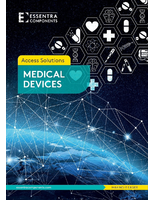ANSI responds to Congressional standardization inquiry.
Press Release Summary:
Congressman Bart Gordon sent inquiry asking various companies and organizations for their views on 4 questions relating to standards and standardization system. These cover importance of technical standards; if there is need for review of standards-setting process; need for full assessment of system; and if single federal coordinating point for standards is needed. ANSI response, sent to Gordon on November 12, is available on Key Documents of Interest page on ANSI Online.
Original Press Release:
ANSI Submits Response to Standardization Inquiry from Congressman Gordon
The American National Standards Institute (ANSI) would like to share with all interested stakeholders its response to a recent inquiry on standards and the standardization system from Congressman Bart Gordon, chair of the U.S. House of Representatives Committee on Science and Technology.
Congressman Gordon sent an inquiry to a number of companies and associations asking them for their views on four questions relating to standards and the standardization system. As coordinator of the U.S. standards and conformity assessment system, ANSI asked Committee staff if organizations that were not in direct receipt of the inquiry could answer, and received a positive response. The Institute developed a response with input from the ANSI Executive Committee, and the final transmittal was send to Congressman Gordon's office on November 12, 2009.
Congressman Gordon's questions and summaries of ANSI's responses follow:
How important are technical standards?
Voluntary consensus standards and compliance activities are essential to the U.S. economy. Market-driven and highly diversified, standards support technological innovation, build bridges to new markets, and create gateways for businesses in this increasingly complex world of global access. This relationship between standards and innovation is one of the greatest advantages of our national standards system.
Do you think a comprehensive review of our standards-setting process is timely and worthwhile?
It is always a valuable exercise to conduct a comprehensive review of any system or process on a periodic basis. Over the past ten years, the U.S. standardization community - including government agencies - has done just that with the publication of a National Standards Strategy (2000) and again with an updated United States Standards Strategy (USSS; 2005).
Earlier this year, ANSI also looked at the U.S. standards system and processes when we responded to the National Survey of United States Standardization Policies issued by the Center for Global Standards Analysis. According to the final survey report, "the virtually unanimous view from survey respondents is that current United States policies for the development of private-sector technology standards are working well, and that no changes to those policies or the current balance of private-sector/public-sector partnership relating to standards are necessary at this time."
With the globalization of technology development and business, is it time to assess an international standards system developed 50 years ago?
Just as our national standards system has been reviewed by its participants over the years, so too have the International Organization for Standardization (ISO), International Electrotechnical Commission (IEC), and the International Telecommunication Union (ITU) examined the evolving needs of their constituents.
ANSI believes that the current international standards system is working well. Both the U.S. government and private sector participate in international standards activities in a variety of ways: through treaty organizations such as ITU where governments are members; through organizations like ISO and IEC where the U.S. is represented by a single "national body" organization; through professional and technical organizations whose membership is on an individual or organizational basis; and through consortia, whose membership is typically technology based.
As you know, the administration's recent 60-day cybersecurity review recommends a single point in the federal government to coordinate our government's position on international cyber standards. Should the Committee examine this issue, a single federal coordinating point for all technical standards areas?
In ANSI's view, interagency technical coordination and increased participation by government experts in standards development work is strongly encouraged. In fact, federal agency technical representatives are often active participants in many standards-setting activities, and that participation is both valued and welcomed. When the government has particular concerns about specific areas of technical activity, then agency representatives should work within the voluntary consensus standards system to help craft coordinated solutions that meet the needs of both the public and private sectors.
ANSI's response to Congressman Gordon's inquiry is also available on the Key Documents of Interest page on ANSI Online.
A one-stop site that aggregates background information and news on key issues of interest to the standardization community, the Key Documents of Interest resource is meant to empower ANSI members and stakeholders through shared information and messaging. It is also meant to clearly present the Institute's positions on key issues, and offer members and stakeholders the opportunity to take freely from these texts in developing responses and/or position papers for their own organizations.




